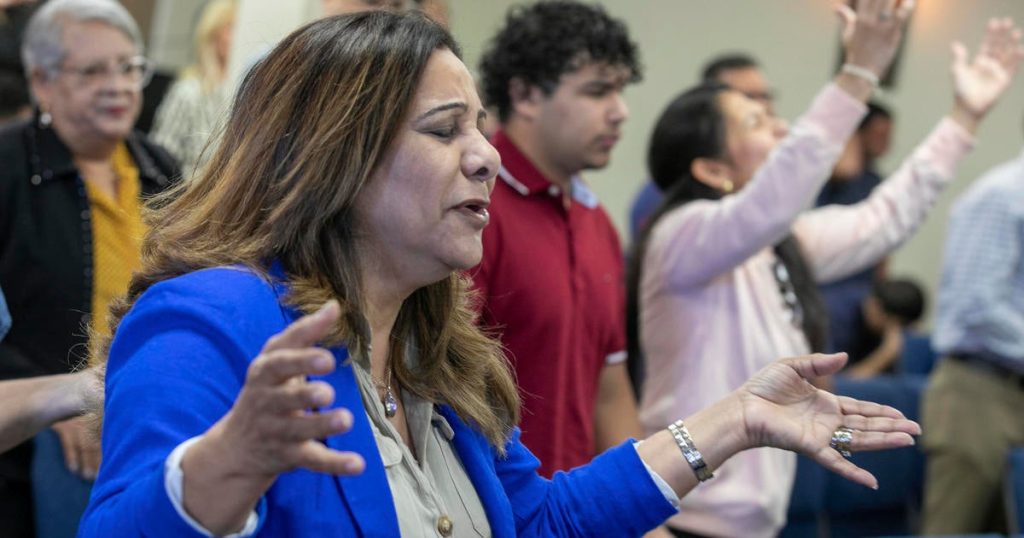A Coalition of Faith: Religious Groups Unite Against Trump Immigration Policy
On Tuesday, a diverse coalition of more than two dozen Christian and Jewish organizations, collectively representing millions of Americans, filed a federal lawsuit challenging a Trump administration policy that grants immigration agents greater authority to make arrests at houses of worship. This lawsuit, submitted to the U.S. District Court in Washington, D.C., asserts that the new policy has instilled fear among congregants, leading to decreased attendance at worship services and vital church programs. The plaintiffs argue that this constitutes an infringement on their religious freedom, particularly their ability to minister to migrants, including undocumented immigrants. As the Most Rev. Sean Rowe, presiding bishop of the Episcopal Church, explained, "We cannot worship freely if some of us are living in fear." The lawsuit seeks to protect the right to gather and practice faith without coercion, reflecting the command to "love our neighbors as ourselves."
The Ripple Effect: How the Policy Impacts Religious Communities
The new policy, implemented in January, allows immigration agents to conduct arrests at houses of worship without prior approval from a supervisor, relying instead on their discretion. This shift has created an atmosphere of fear, causing many congregants, including undocumented immigrants, to avoid attending services and participating in church programs. The lawsuit highlights how this policy undermines the sacred role of houses of worship as safe spaces for worship and community support. For instance, many churches and synagogues host food banks, shelters, and other services for vulnerable populations, including undocumented individuals. The fear of raids has led some congregations to transition to online services, as attendees worry about their safety and the well-being of their families. Rev. Carlos Malavé, president of the Latino Christian National Network, described the situation as one of "deep-seated fear and distrust," where even daily activities like going to the store have become daunting.
The Government’s Stance: Dismissing Claims of Harm
The Trump administration has yet to respond directly to the new lawsuit, but a recent Department of Justice memorandum provides insight into its position. The memo, filed in response to an earlier lawsuit by Quaker congregations and other groups, argues that the plaintiffs’ request to block the policy is based on speculative future harm rather than immediate, concrete injury. It contends that immigration enforcement in sensitive locations, including houses of worship, has been permitted for decades and that the new policy merely streamlines the process by allowing agents to use their discretion. The memo also suggests that any relief granted should be limited to the specific plaintiffs rather than applying nationwide. This argument attempts to downplay the broader implications of the policy and the widespread fear it has generated among religious communities.
A Broad Coalition: The Scale of the Lawsuit
The new lawsuit represents a significant escalation in the challenge to the Trump administration’s immigration policy, involving a much larger and more diverse group of plaintiffs than previous legal actions. Among the plaintiffs are major religious organizations such as the Union for Reform Judaism, the Episcopal Church, the Presbyterian Church (U.S.A.), and the African Methodist Episcopal Church, the nation’s oldest predominantly Black denomination. Other plaintiffs include the Mennonite Church USA, the Unitarian Universalist Association, and regional branches of the United Methodist Church and the United Church of Christ. Together, these groups represent millions of worshippers across the country. Kelsi Corkran, lead counsel for the lawsuit and a lawyer with the Georgetown University Law Center’s Institute for Constitutional Advocacy and Protection, emphasized the significance of the coalition: "The massive scale of the suit will be hard for them to ignore." She added that the plaintiffs are united by a shared religious obligation to serve refugees, asylum seekers, and immigrants, regardless of their legal status.
The Broader Debate: Sanctuary and the Role of Houses of Worship
The lawsuit taps into a long-standing debate about the role of houses of worship as sanctuaries for vulnerable individuals. While some conservative faith leaders and legal experts argue that places of worship should not serve as havens for illegal activity, others see them as sacred spaces that offer refuge and support to those in need. Professor Cathleen Kaveny of Boston College noted that houses of worship have historically been viewed as places of sanctuary, akin to "embassies" representing a higher moral authority. She warned that the administration’s disregard for this tradition could have far-reaching consequences, both legally and morally. The U.S. Conference of Catholic Bishops, though not a plaintiff in the lawsuit, has also criticized the administration’s immigration policies, and Pope Francis recently condemned the deportation plan, urging compassion for migrants.
A Call to Action: The Fight for Religious Freedom and Sanctuary
The legal challenge mounted by these faith groups underscores the deepening conflict between religious freedom and immigration enforcement under the Trump administration. At its core, the lawsuit is a call to protect the ability of religious communities to fulfill their spiritual mandate to serve the vulnerable without fear of retribution or interference. As the case proceeds, it will likely spark further debate about the balance between national security, immigration enforcement, and the sacred role of houses of worship in American society. The plaintiffs hope that by standing together, they can reclaim the freedom to worship, serve, and love their neighbors without fear of division or exclusion.












